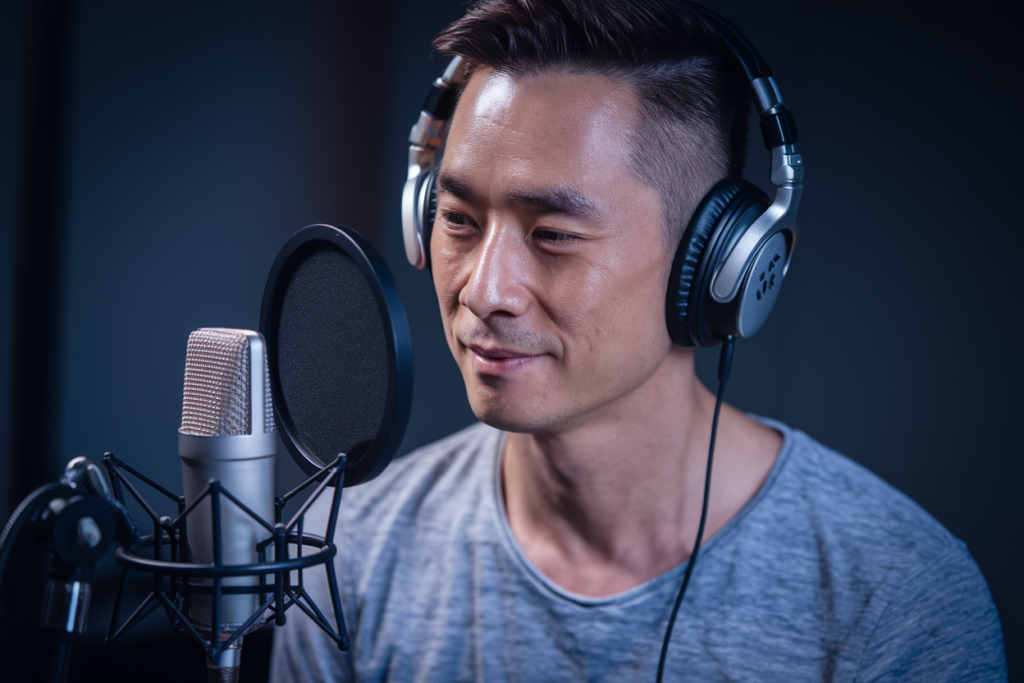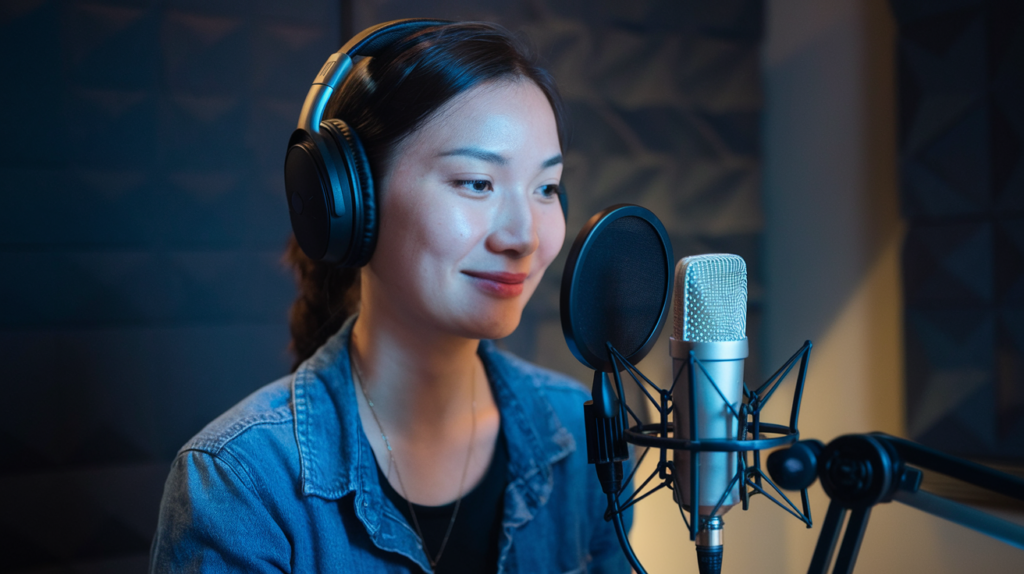Key Takeaways
- Cultural Connection: Mandarin serves as a bridge connecting diverse audiences, enhancing relatability and authenticity in voice acting projects.
- Rich Linguistic Features: Its tonal nature and unique phonetics allow voice actors to convey complex emotions and character nuances effectively.
- Growing Market Demand: The increasing popularity of Mandarin in entertainment reflects a booming market for content that resonates with over 1 billion speakers worldwide.
- Historical Significance: Engaging skilled Mandarin voice talent taps into centuries of literary tradition, enriching modern storytelling with cultural depth.
- Global Appeal: Projects utilizing Mandarin foster inclusivity while appealing to international audiences through authentic representation.
- Diverse Expression: The tonal richness of Mandarin enhances character portrayal, making narratives more engaging and memorable across cultural boundaries.
Ever wondered why Mandarin is the go-to language for voice acting in so many projects? With its rich cultural history and growing global influence, it’s no surprise that more studios are opting for Mandarin to connect with audiences.
Overview of Mandarin in Voice Acting
Mandarin has become a prominent choice in voice acting due to its widespread use and cultural significance. This language isn’t just about communication; it’s a bridge connecting diverse audiences across the globe. As studios look to engage viewers, they recognize that incorporating Mandarin can enhance relatability and authenticity.
The sound of Mandarin brings unique tonal qualities that add depth to characters. Voice actors proficient in Mandarin offer distinct nuances, which can elevate storytelling. With over 1 billion speakers worldwide, choosing Mandarin opens doors to vast markets, making projects more appealing both domestically and internationally.
Additionally, trends indicate a growing demand for Mandarin voiceovers in animation, video games, and commercials. As content creators strive for inclusivity, hiring talented voice artists who excel in Mandarin becomes crucial for resonating with audiences. This shift reflects an understanding that effective voice talent goes beyond mere translation; it captures the essence of culture and emotion.
Embracing Mandarin in voice acting not only broadens reach but also enriches narratives with cultural authenticity. Engaging skilled voice over actors who understand this language ensures your project stands out in today’s competitive landscape.
Cultural Significance of Mandarin
Mandarin holds profound cultural significance, shaping narratives across various forms of media. Its history and global influence make it a compelling choice for voice acting.
History of Mandarin Literature
Mandarin literature dates back thousands of years, showcasing a rich tapestry of stories that reflect societal values and philosophies. Classic works like “The Dream of the Red Chamber” and “Journey to the West” have laid the groundwork for narrative styles still evident today. These literary traditions inform modern storytelling, providing depth and context that enrich voiceovers. When you engage a voice actor fluent in Mandarin, you’re tapping into this historical wealth, allowing characters to resonate with authenticity.
Influence on Media and Entertainment
The rise of Mandarin in media has transformed entertainment landscapes globally. As Chinese cinema and television gain traction, more content creators prioritize hiring skilled voice artists capable of delivering nuanced performances. The demand for high-quality voiceovers in animation, film dubbing, and commercials continues to grow as audiences seek relatable characters with genuine voices. Understanding cultural references enhances engagement; therefore, working with talented voice actors who embody these elements can elevate your project’s impact significantly.
Embracing Mandarin in your projects not only broadens market reach but also fosters inclusivity by acknowledging diverse cultures through authentic representation.
Linguistic Characteristics of Mandarin
Mandarin’s unique linguistic traits make it a standout choice for voice acting. Understanding these characteristics can enhance the effectiveness of your projects.
Phonetics and Tonality
Mandarin is a tonal language, meaning that pitch contours change the meanings of words. There are four primary tones, plus a neutral tone, each offering distinct sound patterns. For example, “ma” can mean mother, horse, scold, or hemp depending on its tone. This tonal richness allows voice artists to convey subtleties in character emotions and intentions effectively. When you choose a proficient voice actor fluent in Mandarin, they bring this dynamic phonetic structure to life, adding layers to your narrative.
Expressiveness and Emotion
The expressiveness of Mandarin stems from its intricate vocabulary and syntax. Fluent voice actors understand how to manipulate their delivery to evoke specific emotions—whether it’s urgency in action scenes or tenderness in romantic dialogues. The ability to communicate nuanced feelings through vocal inflections makes Mandarin particularly powerful in storytelling contexts. Engaging skilled voice talent ensures your characters resonate with authenticity and depth, connecting more profoundly with audiences across cultural backgrounds.
Market Demand for Mandarin Voice Actors
Mandarin voice actors are increasingly sought after, reflecting the booming market for Mandarin content. The demand arises from various sectors, including animation, video games, and commercials. As global interest in Chinese culture rises, projects featuring Mandarin gain traction.
Growth of the Chinese Entertainment Industry
The Chinese entertainment industry has seen remarkable growth over the past decade. With an expanding audience base both domestically and internationally, studios prioritize hiring skilled Mandarin voice talent to connect with viewers effectively. This growth translates into more opportunities for voice artists fluent in Mandarin to showcase their skills across different platforms. Major films and series often require authentic performances that make characters relatable to diverse audiences.
Global Appeal of Mandarin Content
Mandarin content holds significant global appeal due to its rich storytelling tradition and cultural depth. Engaging a proficient voice actor who understands these nuances enhances character portrayal and makes narratives resonate on a deeper level. Projects utilizing Mandarin not only cater to vast markets but also foster inclusivity by representing authentic voices within stories. As consumers seek connections through relatable characters, incorporating talented voice over artists becomes crucial for success in today’s competitive landscape.
Benefits of Choosing Mandarin for Voice Acting
Choosing Mandarin for voice acting offers numerous advantages that resonate with both creators and audiences. Its growing popularity reflects a strategic decision to connect authentically with diverse viewers.
Accessibility to Chinese Audiences
Mandarin serves as a direct pathway to over 1 billion speakers, providing unparalleled access to one of the largest markets in the world. This accessibility means projects can reach millions who seek content that speaks their language—not just literally but culturally too. By incorporating skilled voice talent fluent in Mandarin, you ensure your narratives engage audiences deeply, fostering loyalty and enhancing viewer satisfaction. Plus, localizing your content through native voices makes it more relatable and impactful.
Diversification of Character Expression
Mandarin’s tonal nature adds layers of expression that enrich character portrayal. With its ability to convey subtle emotional nuances through pitch and tone, voice actors can bring characters to life in ways other languages may not capture as effectively. A proficient voice artist understands these intricacies, allowing them to evoke specific feelings or intentions simply through vocal modulation. This diversification enhances storytelling by making characters multidimensional—something every project aims for when competing for audience attention.
Embracing Mandarin not only broadens market reach but also elevates the quality of voiceovers, creating memorable experiences that resonate across cultural boundaries.
Conclusion
Choosing Mandarin for voice acting not only opens doors to a vast audience but also enriches storytelling in unique ways. Its tonal nature and cultural depth allow voice actors to convey emotions and nuances that resonate deeply with viewers. You’ll find that engaging skilled Mandarin talent enhances character portrayal, making narratives more relatable and impactful.
As the global demand for authentic representation continues to rise, embracing Mandarin becomes essential for studios looking to connect with diverse audiences. This strategic choice fosters inclusivity while tapping into the rich historical roots of the language, ensuring projects stand out in today’s competitive landscape. By prioritizing Mandarin voice acting, you’re investing in quality storytelling that transcends cultural barriers and leaves a lasting impression.
Frequently Asked Questions
Why is Mandarin becoming popular in voice acting?
Mandarin’s popularity in voice acting stems from its rich cultural history and the demand for authentic representation. With over 1 billion speakers globally, studios see it as a way to engage diverse audiences effectively. Its unique tonal qualities also enhance character depth, making stories more relatable.
How does Mandarin enhance storytelling in projects?
Mandarin enhances storytelling by allowing skilled voice actors to convey emotional nuances through its tonal nature. This expressiveness helps characters resonate authentically with viewers, enriching narratives and creating deeper connections across various cultures.
What industries are driving the demand for Mandarin voice actors?
The growing interest in Chinese culture has led to increased demand for Mandarin voice actors across animation, video games, and commercials. The expanding Chinese entertainment industry prioritizes skilled talent who can connect with both domestic and international audiences.
What are the benefits of using Mandarin in media projects?
Using Mandarin provides access to a vast audience of over 1 billion speakers, fostering viewer loyalty through culturally resonant content. Additionally, its tonal richness allows for nuanced character expressions that elevate the quality of storytelling.
How does historical literature influence modern Mandarin voice acting?
Classic works like “The Dream of the Red Chamber” have shaped narrative styles that enrich contemporary storytelling. Engaging fluent Mandarin voice actors taps into this literary heritage, allowing projects to resonate with authenticity and depth rooted in tradition.







